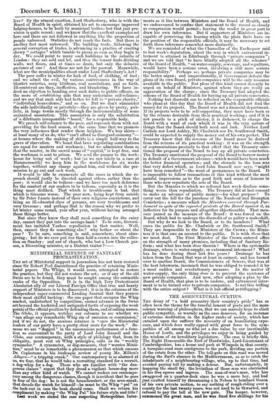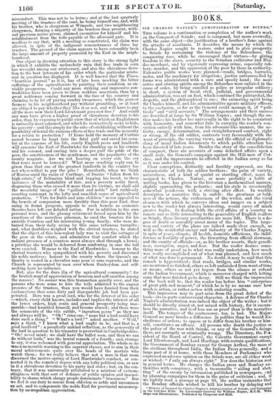THE AGRICULTURAL CURTIUS.
THE decay of " a bold peasantry their country's pride " has so often been the theme for the tuneful lament of poets and the more solemn warning of philosophers, that we can scarcely hope to elicit public sympathy, as warmly as the case deserves, for an instance of extreme destitution in the higher ranks of society, which has entailed upon the sufferer the necessity of an humiliating expo- sure, and which does really appeal with great force to the sym- pathies of all among us who set a due value by our inestimable House of Lords, and the privileges we enjoy in being guided by the wisdom of an hereditary legislature. The case is briefly this. The Right Honourable the Earl of Hardwicke, Lord-Lieutenant of Cambridgeshire, has a house and park at Wimpole in that county. A turnpike-road runs contiguous to the park, dividing one portion of the estate from the other. The toll-gate on this road was moved during the Earl's absence in the Mediterranean, so as to catch the inhabitants of a neighbouring rvillage, who, up to that time, had avoided paying toll by making a detour. But, unfortunately, in trapping the small fry, the leviathan of those seas was obstructed in his free egress and ingress. The man-of-war's-man, who has swaggered on 'a quarter-deck since he was a mere boy, and had just exalted himself by threatening a in Nelson to bombard Genoa of his own private motion, to say nothing of rough-riding over a county for the last twenty years, was not used to be thwarted, and refused to pay the toll at the new gate. The keeper, however, summoned the great man, and he was fined five shillings for his
misconduct. This was not to be borne ; and at the last quarterly meeting of the trustees of the read, he being himself one, and, with his brother, who is clergyman at Wimpole, and two neighbouring clergymen, forming a majority of the trustees then present, with- out previous notice given, claimed exemption for himself and his establishment from the tolls payable at the aforesaid gate. It is needless to say that, with a meeting so constituted, the claim was allowed, in spite of the indignant remonstrances of three lay trustees. The ground of the claim appears to have ostensibly been the large amount of property possessed by the Earl in the neigh- bourhooil. light
in Our idbritaswineg am e na nt Chile lt story fires tehe stdeening
has wrought among our aristocracy, and also the chivalrous devo- tion to the best interests of his order which the particular aristo- crat in question has displayed. It is well known that the Times, "heartless journal" as it is, has of late been mocking the bitter sufferings of the agriculturists by painting their condition as en- viably prosperous. Could any more striking and impressive con- tradiction have been given to those reckless assertions, than by a great nobleman coming forward in the face of his country and claiming to be let off paying sundry twopences, which the poorest farmers in his neighbourhood pay without grumbling, or at least are obliged to pay whether they like it or not, and will have to pay all the more now their Lord-Lieutenant goes scot free ? And could any man have given a higher proof of chivalrous devotion to his order, than by exposing to public view that of which an Englishman is naturally most ashamed, and which he instinctively seeks to hide, his poverty—and this simply for the sake of establishing without the possibility of denial the ruinous effects of free trade and the necessity for a return to protection ? If Rome held the memory of Curtius sacred because he leapt into the fatal gulf and saved his coun- try at the expense of his life, surely English peers and landlords will canonize the Earl of Hardwicke for standing up in his ermine and his coronet, and casting into a deeper gulf the pride of the peer, the sensitiveness of the gentleman, and the popularity of the county magnate. Are we not hearing on every side the cry that rents must be lowered ? What more crushing reply can be given than that one of the greatest landlords in the country has not wherewithal to pay the pike ? Henceforth, when we think of Marius amid the ruins of Carthage, of Darius " fallen from his high estate," of Belisarius blind and begging his bread, to these instances of the mutability of fate, and a poverty nobly faced, disgracing those who caused it more than its victims, we shall add the mournful image of the "gallant and noble" lord ruthlessly courting contempt in the lofty and unselfish cause of agricultural protection. " Vote for Bubb and nine children" never appealed to the bowels of compassion more forcibly than this poor Earl, thus suing in forma pauperis, appeals to such bowels as economic theories have left our deluded nation. For in addition to his own personal woes, and the gloomy retirement forced upon him by the exactions of the merciless pikeman, he sued the trustees for his amiable Countess and his interesting young family, who were de- barred from their daily airing by this same infamous turnpike ; and, what doubtless weighed with the clerical trustees, he stated that the object of this benevolent lady was to visit the cottages of the poor on the estate, and administer that comfort which the radiant presence of a countess must always shed through a hovel ; a privilege she would be debarred from conferring in case the toll were exacted. Honour to the Earl of Hardwicke ; honour to the clerical trustees who sympathized with his poverty and discerned his noble motives; honour to the county where the Queen's au- thority is vested in a chevalier sans peur et sans reproche, and the Church is represented by men over whom flunkeydom and self- seeking have no influence.
But, alas for the dura ilia of the agricultural community ! for the brutish want of appreciation of heroism and self-sacrifice among the masses ! No sooner was this transaction quietly over, and the persons who were some to hire the tolls admitted to the august presence of the trustees, than you would have fancied from their exclamations that some dirty and disreputable job had been per- petrated. Here was a great lord, who for the interest of his order —which, every child knows, includes and implies the interest of all the lower orders, high' rents and general prosperity being inse- parable—had humbled himself, and become abased; and these were the comments of the vile rabble, " ingratum peens" as they are and always will be. " Oh!" cries one, " none but a lord could have done such a thing." " What's a lord ?" asked another. " Well," says a third, " I know what a lord ought to be, and that is, a good landlord" ; a peculiarly unkind reflection, as the generosity of the lord in question to his tenantry is proverbial in Cambridgeshire. " Ohl never mind ; we shall have the ballot soon, and then we can do without lords," was the brutal remark of a fourth ; and, strange to say, it was welcomed with general approbation. The whole se Ine was amemorable warning to the superior classes, not to aim in their moral achievements quite over the heads of the mortals who watch them ; for we really believe that not a man in that room discerned the motive-spring of Lord Hardwicke's conduct, or con- nected it in the remotest degree with any lofty political aim, or saw in it a chivalrous devotion to his party and order ; but, on the con- trary, that it was -universally attributed to a mixture of extreme stinginess with that sort of defiance of public opinion and insensi- bility to shame which slangy people denominate " brassiness." But we feel it our duty to rescue from oblivion so noble and uncommon an act, and to compensate the noble Forl for provincial misconcep- tion by metropolitan appreciation.



























 Previous page
Previous page